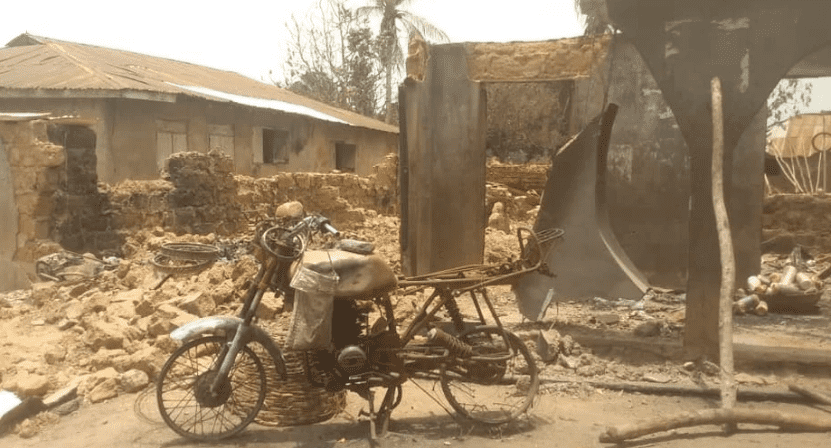According to the traditional leader of the community, herdsmen have been attacking and killing members of the community since 2006.
One of the properties destroyed by herdsmen at Asa a community that shares borders with Benin Republic. (Pulse)
Asa is an agrarian community in the Yewa region of Ogun state. It is one of the many villages that share boundaries with the Republic of Benin in the local government.
While its proximity to the francophone country through one of the porous borders is less than five kilometres, its distance to Ilaro, the adjudged capital of Yewaland is about 40 kilometres.
Apart from the fact that a few people in the community own motorbikes, which some of them use for commercial purposes, there is little or no sign of modernism in Asa, Ibeku, Agbon-Ojodu, Iselu and other surrounding communities.
Some of these communities are dotted with mud houses and barns made of thatch at their backyards for the preservation of crops after harvest.
However, a settlement one expects to be peaceful due to its rural nature and the rustic lifestyle of its inhabitants was recently thrown in turmoil after criminal herdsmen displaced its residents and set their homes on fire.
On Easter Monday, when Pulse visited Asa, the community looked like a shadow of itself with its residents still living in fear of an imminent return of herdsmen.
Faces of many residents of the community, whose property were burnt to ashes, still reflect the sad memory of the February 14 tragedy.
According to the acting Baale, the traditional head of the community, Chief Mathew Akande Olukoku, herdsmen have been attacking and killing members of the community since 2006.
Olukoku, who shared pictures of previous victims of herdsmen attacks in Asa with Pulse, explained that herders usually killed their victims on their farms, but in February, they invaded the town shooting and setting properties ablaze.
“Fulani herdsmen have been killing people since 2006 in this town. Then, they used to commit their atrocities in farms, but this year, they came into the town to kill,” Olukoku said in Yoruba sorrowfully.
Contents
It was war!
For many residents of Asa, the sporadic booms of gunshots that sent chills down their spines in the evening of Valentine’s day would never be forgotten in a hurry.
Some of them likened the incident to war. They said all they could do after herdsmen descended on their homes at night with dangerous weapons and guns was to run for their lives to nearby communities in the Republic of Benin.
While some ran to Towe in Benin, others sought refuge at the palace of Oba Adio Ogunji, the traditional ruler of Egeluland at Pobe Local Government also in Benin.
Recounting his ordeal, one of the traditional chiefs of Iselu Kingdom, Mr, Ebenezer Akapo, who claims to be the landlord of one of the burnt houses in Asa, narrated how criminal herdsmen gunned down his tenant, Kehinde Gbadamosi and also razed down his house.
“When the unfortunate gun-wielding Fulani herdsmen invaded our community, it was God that saved me. We both ran into this building. I told him to let us run into the bush but because of the gunshots, fear gripped him, he was not bold enough to run out of the house, they killed him and set the house on fire.
“Currently, my wife has no clothes to wear. These herdsmen dealt with me very badly. Everything belonging to my daughters who are married was burnt. If anyone invites me anywhere now, I have no clothes to wear. The new motorcycle I just acquired was burnt. Now, I sleep in my in-laws’ house. My wife’s corn barn was burnt to ashes. All my children’s books were reduced to ashes. They also burnt my cousin’s car.”
Days after the incident, Gbadamosi’s remains were buried in front of the house he was killed because his decomposing body could not be conveyed to his home state of Oyo.
Apart from Gbadamosi, a woman, who spoke to Pulse in Egelu in Benin said one ailing man died in the bush while running away from criminal herdsmen. She added that three pregnant women also delivered their babies in the bush.
She said, “One ailing man asked his family to leave him and run for their lives, but his children managed to escape into the bush with him. In the end, the man died in the bush. Three pregnant women also delivered their babies in the bush during the crisis.”
Charred remains of property everywhere
To authenticate his claims on the atrocities herdsmen committed in his community, Olukoku asked one of his aides, Bamirole Okose to take Pulse through the community to show burnt houses, charred remains of motorcycles and ashes of barns that were some weeks ago bustling with crops.
Even though the Easter festival coincided with their market day, the recently deserted Asa still presented an appearance of a community that is yet to return to life.
While many victims who fled have returned and rehabilitated their burnt houses, the skeleton of other houses and motorcycles remain visible at the spot they were razed, staring at their helpless owners.
Even with the rehabilitation, black streaks caused by the conflagration could still be seen on the walls of many houses in the community.
Why herdsmen struck
Explaining the cause of the crisis, Okose, who was among those who fled to Egelu said herders attacked the village after the community rejected them.
Okose, who spoke in Yoruba said, “Fulani herdsmen came into our communities. They came with some policemen to inform us that they are bringing their cattle to feed in this area. They started from Ibeku and the people of the community told them that they can’t accommodate them because they are farmers. Unknown to them, the herdsmen took offence with the reason they gave.
“When they came to Asa, we told them to wait for members of the community to return from the farm to seek their opinion on Fulani herdsmen living in their community. Days after, they invaded a farm at Agbon village, shooting sporadically. By night time, they came in large numbers, it was God that saved many of us.”
‘We have no power to sue or fight them’ — Asa resident
Another resident of Asa, Akinola Israel, a farmer and commercial motorcycle operator, who took Pulse to the palace of Oba Ogunji in Egelu, said the people of Asa and neighbouring villages have no money to sue herdsmen because the herdsmen are wealthier and more influential.
Akinola, who had been a victim of the destructive behaviour of criminal herdsmen before the recent attack, said one of them once asked him and his family to leave their maize plantation for his cattle to feed on.
“One day, we were in our farm tending to our crops, a herdsman came and asked us what we do with the crops and we answered him. He then asked us to leave the farm for his cattle to feed. When we protested against his request, he drew a cutlass. We had to run, we could not take our motorcycles. The cattle ate up all the maize in the plantation of about 16 acres’, Israel lamented.
He added that there was nothing they could do to confront herders because they could get killed if they resist their high-handedness.
He said, “There have been instances when they slaughtered people on their farms. It is not as if anyone offended them, but whenever they rear their cattle to a place where they see fresh crops especially maize, they’ll set their animals into it.
“We can’t confront them because we are farmers, we don’t have money to sue them. For instance, if a lawyer asks us to bring N50m, a herdsman will bring N60m. Even if we have a good case, won’t there be injustice? There is absolutely nothing we can do.”
According to the residents, the last time a herder was attacked and killed in 2018 in a neighbouring village, the now defunct SARS (Special Anti-Robbery Squad) operatives indiscriminately arrested two people in Asa, and while one of them is still at Elewe-Eran prison in Abeokuta, Ranti Balogun, a young farmer who’s on bail, shuttles between his house and court in Ilaro in a bid to clear his name.
Cups of rice and garri for victims- Asa residents allege
While Oba Ogunji of Egelu and the Chairman of Pobe Local Government in Benin Republic, Simon Adebayo, accommodated and fed the displaced Nigerians who fled to their territory for refuge during the crisis, the Federal and Ogun State governments played down the crisis, saying no Nigerian fled to Benin.
But after the crisis gained media traction, the state government allegedly made a lame effort to address the plight of the victims.
According to Okose, after their return to Asa, the state government handed to victims whose houses were burnt a few cups of rice and garri, adding that other residents of the community received nothing.
The residents also alleged that throughout the period of the crisis, there was no security presence in all the affected communities. Many accused the government of abandoning them to their fates.
‘It is a lie’, Ogun State Government reacts
Reacting to the allegations by Asa residents, Barrister Kayode Oladele, Chairman Ogun State Peace Committee said the state government deployed police to the area during the crisis.
He said, “How can anybody say there was no security presence? Do you think the security presence we are talking about is for us to put somebody there 24/7 to be sleeping there?
“Even if you go there and you didn’t see anybody, it does not mean there was no security presence. When you put security in place, what they do is to do a patrol, they cannot stay in one place, they patrol not only Asa, we have Agbon-Ojodu, we have Owode-Ketu, they move from one place to the other from time to time. They go to Iselu, they go to Oja-Odan, you can’t spend 30 minutes in Asa and say you didn’t see the police, that is not how security works”.
Oladele also debunked the claim that the state government shared negligible palliatives to victims in Asa. He said the food items that were shared during the crisis were bagged, adding that nobody shared cups of anything with anyone.
Oladele said, “I think there is something wrong when you say they were given cups of rice and garri. The acting Baale of Asa could not in any way have told you that, we have pictures. Not only there, we gave them palliatives all over. If you go to Egua, the Elegua will tell you that we brought palliatives to the palace and he took delivery personally. Nobody gave anybody cups of anything.
“The palliatives were bagged and given to them. If we give it to the community and they decide to do it the way they want, I don’t have control over that. So, if they decide to give them cups, nobody told me that, I am hearing it for the first time. What we gave to them were not cups.”
However, while life gradually returns to Asa and other areas ravaged by criminal herdsmen in Yewa North, there is still palpable apprehension that herders will return to these communities when the rain stops.
The government of Ogun State is fully aware of this, and residents of these communities are looking forward to the steps the state government will take to forestall a repeat of February 14 in their communities.
Source: Pulse




















































